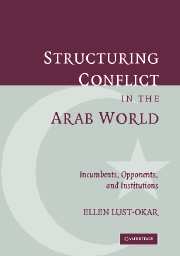Book contents
- Frontmatter
- Contents
- List of Figures and Tables
- Acknowledgments
- A Note on the Use of Language
- Abbreviations
- Introduction
- 1 The Manipulation of Political Opposition
- 2 Structures of Contestation
- 3 Playing by the Rules: The Inclusion and Exclusion of Political Oppositions
- 4 Dynamics of Opposition in Unified SoCs
- 5 Opposition Dynamics in Divided SoCs
- 6 Formal SoCs and Informal Political Manipulation
- Conclusion
- Appendix: Political Forces in Egypt, Jordan and Morocco
- Notes
- Bibliography
- Index
Conclusion
Published online by Cambridge University Press: 22 September 2009
- Frontmatter
- Contents
- List of Figures and Tables
- Acknowledgments
- A Note on the Use of Language
- Abbreviations
- Introduction
- 1 The Manipulation of Political Opposition
- 2 Structures of Contestation
- 3 Playing by the Rules: The Inclusion and Exclusion of Political Oppositions
- 4 Dynamics of Opposition in Unified SoCs
- 5 Opposition Dynamics in Divided SoCs
- 6 Formal SoCs and Informal Political Manipulation
- Conclusion
- Appendix: Political Forces in Egypt, Jordan and Morocco
- Notes
- Bibliography
- Index
Summary
Authoritarian leaders not only make the rules, they play by them as well. This stands in contrast to conventional wisdom, which holds that formal institutions make little difference in autocracies. When kings, dictators, or presidents in closed regimes find themselves facing down their opponents, the expectation is that anything goes. The leaders can use a variety of means to stay in power: co-opting the willing; imprisoning, torturing, or killing their adversaries; diverting public attention to external conflicts with international rivals; and occasionally promoting political liberalization. Very little is said, however, of the formal mechanisms they use, particularly the creation of various institutional structures that spell out the rules of the game by which both opposition and incumbent elites should play.
Yet, these rules matter. Incumbent elites do try to repress, appease, and divide and conquer their opposition, as we have long known. They throw some into prison, only to release them decades later; they jail others in the hope of bringing them out much more quickly as changed men (and yes, usually men) who have gained a gloss of legitimacy that only imprisonment can bring, and yet have often lost their spark; and they appease others with ministerial portfolios, fine cars, and fancy wine. At the same time, however, they also make important choices over who is or is not allowed to play the formal game – forming opposition parties, opening offices, publishing newspapers, and calling conferences.
- Type
- Chapter
- Information
- Structuring Conflict in the Arab WorldIncumbents, Opponents, and Institutions, pp. 169 - 176Publisher: Cambridge University PressPrint publication year: 2005



